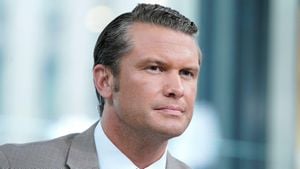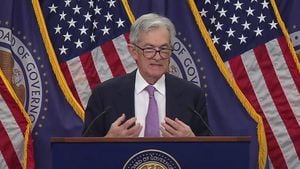Trillions of dollars are being called for to support developing countries battling the mounting challenges of climate change. This is emphasized at COP29, where discussions are heated over financial aid and sustainable adaptations needed to combat the increasing effects of global warming. While studies suggest every dollar invested today could yield four dollars back, raising these funds proves tougher than anticipated.
Countries excluded from China need approximately $1 trillion annually by 2030 for external assistance to curtail their carbon emissions and adapt to climate shifts. This necessary funding is envisioned to flow from foreign governments, significant financial bodies like the World Bank, and the private sector. Yet, some projects are more appealing to investors than others. For example, the development of renewable energy sources, like wind and solar farms, is more likely to get private backing due to their potential profitability.
Avinash Persaud, who serves as the special climate adviser to the president of the Inter-American Development Bank, draws attention to the challenges of financing projects like defensive sea walls, which fail to generate immediate revenue. He stated, “Unfortunately, there’s no magic in finance. And so, it requires public money.” This is compounded by the reluctance of governments to allocate budget funds to these projects.
The European Union, the biggest contributor to international climate finance, is facing internal political and economic pressures, making it less willing to increase aid budgets or send more money abroad. Recent shifts, shown by the threat from newly-elected Donald Trump to withdraw the U.S. from global climate cooperation, raise additional concerns at COP29. Given this political backdrop, crafting effective financial agreements to assist developing nations remains elusive.
During the conference, Persaud noted, “You’re seeing the political climate — governments are not getting elected to raise their aid budgets and send more money abroad.” This means debt-ridden countries find it hard to fund long-term projects, like building sea walls, as they may take decades to pay off. To ease the borrowing burden, Persaud suggested development banks could help drive down interest rates.
Innovative strategies to raise funds could include new taxes on polluting industries, like the shipping sector, coal, oil, and gas industries. Persaud highlighted examples of such initiatives already underway, noting, “For example, $0.09 on every barrel of oil goes toward cleaning up any spills resulting from oil extraction.” He argues for the application of similar strategies globally to finance climate adaptation, referring to growing concerns about atmospheric emissions, likening atmospheric damage to spills needing rectification. Yet, the scope of investment required for climate adaptation remains immense, amounting to $1 trillion annually, requiring $300 billion from public funds alone to set realistic and hopeful plans for future generations.
Reflecting on the scenario at COP29, Mikko Ollikainen, the head of the Adaptation Fund, expressed dismay over the “puzzling” lack of financial pledges to support climate adaptation. There is evident discourse among leaders about safeguarding vulnerable populations from hazardous climate impacts. Still, this has not translated to substantial financial actions during the summit.
Despite documented instances of pressing weather scenarios like hurricanes affecting nations from Spain to the Philippines, and calls from UN leaders, inadequate funds pose severe risks to those most vulnerable. The Adaptation Fund, aimed at providing aid over the last 15 years, reported securing only about $61 million from donor nations against its hoped target of $300 million this year.
UN Secretary-General Antonio Guterres reiterated the urgent need for more financial backing, stating, “These missing dollars are not abstractions on balance sheets; they represent lives lost, crops perished, and opportunities denied.” While discussions are still open for additional government pledges until the conclusion of COP29, there’s skepticism surrounding the situation, with Ollikainen foreseeing more difficulties compared to previous years.
Interestingly, as donors echo the importance of adaptation strategies and endorse grants for climate resilience, the correlation between speeches and actual fund pledges remains perplexingly disconnected. This disjointedness raises questions about the decision-making processes of donor nations, possibly reflecting their desire to observe negotiation outcomes on climate finance goals before committing their resources.
Projects backed by the Adaptation Fund range from aiding farmers cope with droughts to strengthening school infrastructures against disasters across globally vulnerable regions, including Africa, Asia, and Latin America. Yet, with fund distribution lagging, Ollikainen warned of diminishing resources, as the necessity for climate adaptation escalates.
Disappointingly, past climate events have left funding pools unfilled. For example, the Adaptation Fund was also unable to meet its target last year, collecting around $188 million amid other pressing climate-related demands. While the pledge from donations remains minimal, countries like Sweden have offered modest contributions to climate adaptation and resilience efforts across multiple funds. Several European nations have stepped forward with pledges, yet major donors such as the UK and the EU appear to be holding out, lowering prospects for unified financial action this year.
Awareness of the urgent need for financial backing is rising among leaders from small island states; yet, realignment of financial priorities and governance is equally pivotal. African nations participating at COP29 are advocating for more than handouts. They stress the importance of crafting systems aimed at ensuring accountability and fair trade practices alongside the transitioning to cleaner energy sources.
Some African leaders implore the prioritization of instilling structural changes back home to garner confidence from potential funders. Notably, climate justice advocates clarify the need to establish equitable relationships where the significant polluting nations bear more responsibility for the damage incurred and commit to consistent financial support and technical assistance.
This sentiment has gained traction as African leaders articulate demands to hold larger polluters accountable for the impacts faced by poorer nations. Increasing recognition of Africa’s minimal contribution to global emissions (just 3.8 percent), alongside high vulnerability to climate impacts, underpins the necessity for urgent actions from developed nations to assist these countries transitioning to greener futures and adapting to unavoidable climate changes.
Some proposals highlight Africa's projections of needing $2.4 billion for the energy transition; here the immediate outlay of approximately $1.4 billion falls disproportionately on less-resourced countries. Emphasizing fairness, African delegates at COP29 are calling for the richer nations to shoulder their responsibilities, advocating for projects aimed at building resilience through investment rather than aid, addressing concerns over existing governance inequalities.
At COP29, there appears to be consensus around the clear expectations from African nations for financing; yet the concepts involving accountability and efficient governance need urgent consideration. These discussions provoke deep reflection on the adaptability of governments to respond to the demands imposed by their own populations and the necessity to restructure matters of climate finance from the ground up.
Increasingly, the conversation is shifting to what future financing should look like rather than solely relying on existing models of funding. The very tenets of climate justice could guide the dialogue, ensuring it amplifies voices of those directly impacted and securing commitments rooted within principles of equity and shared responsibility.
With the future of our planet hanging in the balance, the developments arising from COP29 will undoubtedly shape how the international community prioritizes climate finance and adaptation strategies going forward. The overarching sentiment surrounding climate change adaptation, particularly directed at developing countries like those from Africa, is one of urgency and necessity, and it remains to be seen whether the discussions translate effectively to meaningful action.



